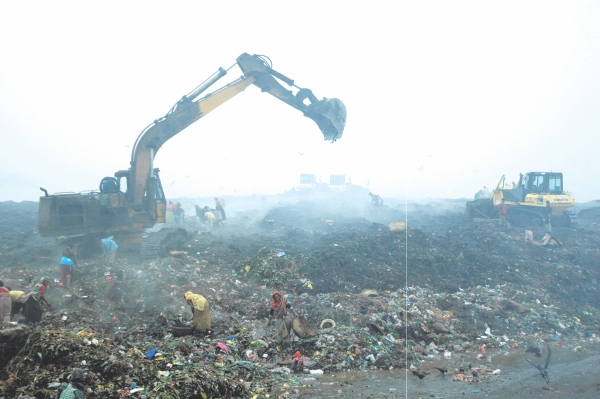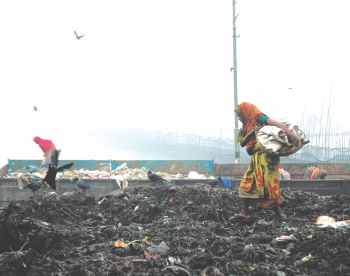| Home - Back Issues - The Team - Contact Us |
 |
| Volume 11 |Issue 03| January 20, 2012 | |
|
|
Perspective Central to quality of life, this ... Shah Husain Imam Hong Kong and Dhaka – do they rub shoulders by any stretch of imagination? One is a city-state plus a free port, the other a state city. Do they have anything in common? It seems they have, despite the huge lag between the two on their scale of development, modernity and urbanisation. The common denominator is, however, their burgeoning population with its co-lateral, shall we say pivotal, waste management concerns. Hong Kong is in the news for its 'controversial' plan to construct a super-incinerator on an unspoiled island. Dubbed as 'the most expensive bonfire in the world', it is designed 'to process some 3,000 metric tonnes of municipal rubbish a day, utilising outmoded technology that will cause extensive damage and increase pollution in the surrounding area' (article titled 'Poor waste management deteriorates quality of life' by Bill Condon; Jan 14, 2012, ChinaDaily, Asia Pacific edition). Honk Kong is 'a very difficult place to be environmentally-friendly on a daily basis', maintain experts. Thus, Dhaka and Hong Kong share points on their flip-side: First, the amount of municipal garbage generated daily in both cities is between 3,000 and 4,000 metric tonnes. Secondly, both are 'difficult places' to be environmentally friendly on 'a daily basis'.
The analogy is important between the two cities for their compulsions to break out of their hamstrings to provide safer living conditions aimed to realise their respective dreams. Hong Kong is an aspirant for becoming 'Asia's world city', a goal that finds resonance with the latest British policy to see it transform into the global Chinese currency hub transacting with the London financial market. This urge for inter-penetration of markets is propelled by the increasing Chinese financial clout vis-à-vis the euro and dollar. Dhaka, on the other hand, is the capital of a country with two warm water ports having potential for deep sea extensions as connectivity links to China, Nepal, Bhutan, India, particularly its Northeast, and Southeast Asia. Our capital city's importance will grow under a wider tapestry of connectivity. Looked through the regional and global prisms, both cities – Hong Kong and Dhaka – have a good deal of work to do in the vital area of providing healthful, hygienic and productive living to their dwellers or tourist and business sojourners. Environmentalists in Hong Kong tend to emphasise adequate facilities and incentives to 'promote best practices at the household level'. This holds true for Dhaka as well. Only that with the high density of people in the metropolis, the level we would have to settle for is not 'household', rather community or the wards. Basically, though each household needs to be educated on the methods of internal cleanliness and trash dumping to be collected and disposed of by the DCC. The slums are a different ballgame.
The city corporation's infrastructure and logistics are ridiculously limited for a mega-polis that Dhaka is about to become. The PM is said to have decided on a bifurcation of Dhaka City Corporation when she saw corporation cleaners barely stripping away at mounds of trash one fine morning! Hopefully, we would see a marked improvement in waste management. As it is, upwards of 8,000 city cleaners serve a population of above 10 million, that too dangerously edging out their backs to traffic well into the thickening morning traffic. Anywhere in the world cleaners will have finished their sweeping before dawn! There are far fewer bins than required. Four to five official dumping sites inadequate in number as they are, solid wastes spill by the riversides at many places polluting water. Private dump-yards are far too many because of legal complications in acquiring land to set up proper dumping sites. A little more on equipment. Three hundred garbage trucks, 'open, dump and others' are supposed to be operative. This fleet has been slightly refurbished by 100 modern carriers including 35 compact, arm-roll types and 45 container carriers. Only Mataul dumping site has been modernised with provision for landscaping through processed wastes. Amin Bazar is next in line. Even so, only 60 percent of the garbage is collected. Hospitals and clinics will have to dispose of their medical wastes which spawn germs, of their own volition or through enforced regulatory measures. Industrial effluence also, needs urgent treatment and disposal. The rag pickers have shown the way. Their survival instinct should be instructive to all others who are basically placed in a survival context. As an army of cleaners collecting aluminium, plastic and metallic cans etc. they hand these over to people who dust and press the materials into various shapes for export. Rag pickers are part of a thriving chain of earnings girdling waste products. Finally, wastes are to be treated not as a problem but as a resource and, therefore, part of the solution. A huge recycling industry can thrive on biogas and other forms of energy generation, not to mention production of organic manure and reduction in carbon footprints. Many countries have done it, and so can we. The writer is Associate Editor, The Daily Star. Copyright
(R) thedailystar.net 2011 |
||||

